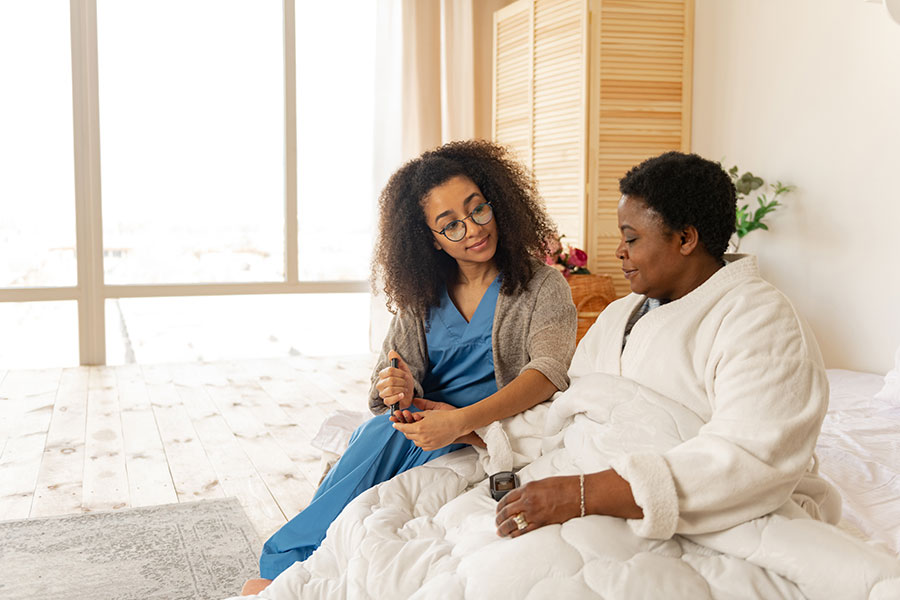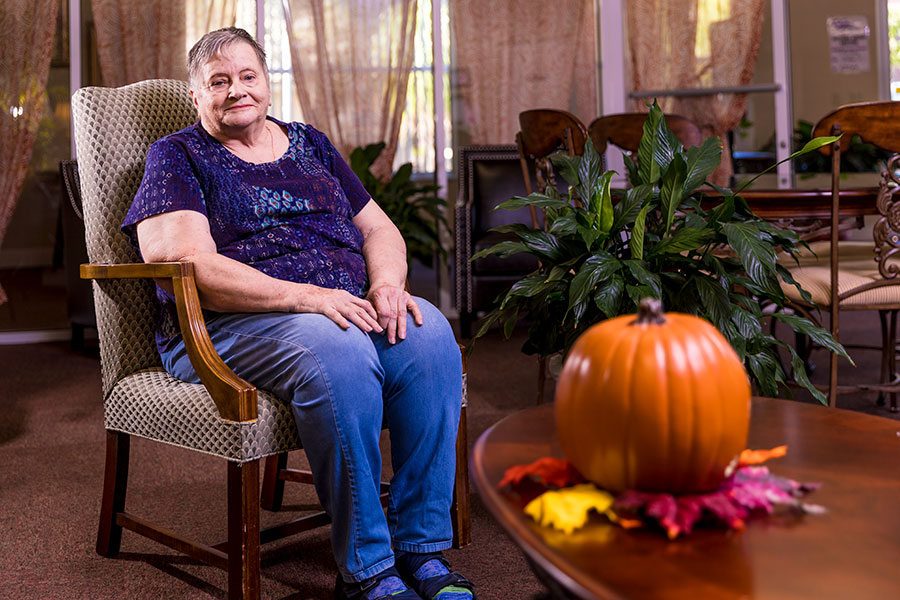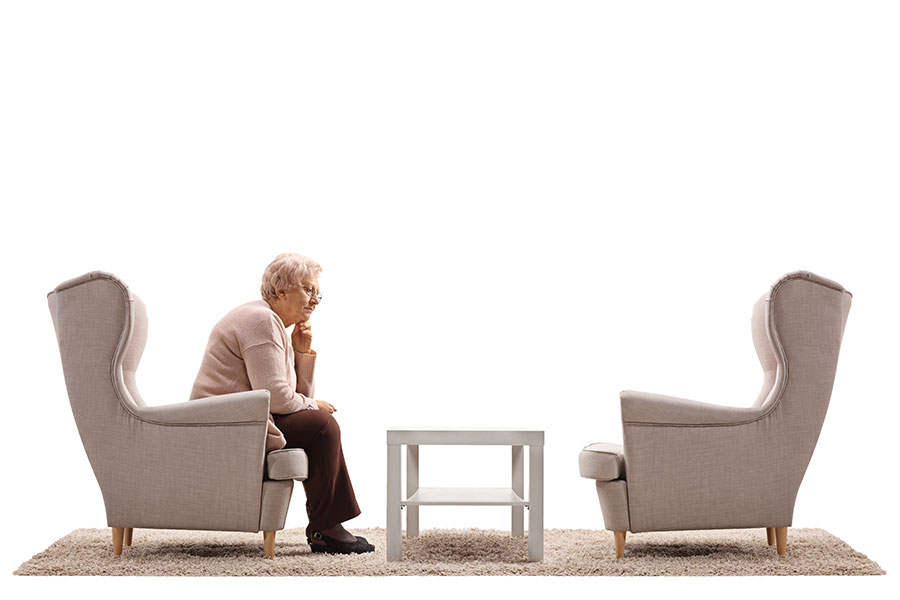The age of alternatives
Everything you need to know about the stages of continuous care, from home health to hospice.
Compiled by Healthy Living staff
Aging in place
Continuing care retirement communities cover all aspects of senior living.
Seniors who are ready to leave their traditional homes behind for the next stage in life can find medical and custodial security at continuing care retirement communities. They offer every facet of care based on each resident’s individual needs: independent living, assisted living and skilled nursing, all on one campus.
CCRCs allow residents to “age in place.” While residents are in good health, they can enjoy all the benefits of independent living, such as having their own apartment or condominium in a maintenance-free environment. They are free from responsibilities such as yardwork or home repairs and have more time to pursue recreational activities. As residents age and they are slowed by illness or physical decline, they can smoothly transition to an assisted living facility, which provides services for people who need help with daily tasks. Skilled nursing is for residents who require higher levels of care.
Memory care units are available at many CCRCs for residents with Alzheimer’s disease, allowing for medical and custodial care of the resident while their spouse receives professional assistance.
Many continuing care retirement communities have accommodations resembling five-star hotels, with appealing amenities such as pools, dining areas, libraries, fitness/spa centers and areas for private physicians to visit residents. Many also provide extensive services such as housekeeping, transportation and social and educational programs.
Double the offerings
Continuing care retirement communities in Lake County are few, but one offers not only the full spectrum of health care but also access to the amenities of The Villages.
Freedom Pointe, part of Brookdale Senior Living, provides four levels of care: independent living, assisted living, memory care and skilled nursing and rehabilitation. Residents can be moved to the next level of care as needed.
In addition to the facility’s own amenities—indoor pool, spa, café/bistro, restaurant-style dining, beauty and barber shop, fitness center—residents also enjoy access to The Villages’ executive golf courses, town squares, swimming pools and tennis, among other activities, according to brookdale.com.
One financial option at Freedom Pointe is a Life Care contract that includes an upfront buy-in fee and a monthly service fee. In return, Life Care guarantees accommodations and care even if a resident’s assets are exhausted through no fault of their own, depending on the contract chosen.
Entry fees for Life Care communities typically range from $150,000 to $300,000, brookdale.com states. Residents may have the option of a refundable contract that returns a portion—up to 90 percent—of the entry fee to a designated beneficiary, and tax deductions may be available for portions of the fees. Rental options also are available in which residents pay a monthly rental fee based on the level of care, with no buy-in fee.
Continuing care retirement communities
Freedom Pointe at The Villages
1550 El Camino Real
352.221.9654
Lake Port Square
600 Lake Port Blvd., Leesburg
352.221.9650
Lakeview Terrace
331 Raintree Drive, Altoona
1.800.343.1588
Insurance coverage
Residents living independently must pay costs out-of-pocket. As assistance is needed, various insurance entities can be utilized according to the level of care needed. Medicare, Medicaid, Veterans Administration and Social Security benefits and long-term private insurance policies may be used, subject to some restrictions. Custodial care is not covered and must be paid out-of-pocket.
At your disposal

Home health care offers an extensive range of services.
An aging couple dependent on each other for care or an individual recovering from surgery or in poor health may utilize home health care, which is available to everyone, regardless of age. Clients may include healthy seniors who need a little assistance at home or with transportation to patients who are recently discharged from a hospital or rehabilitation center and in need of a higher level of care. Companies can provide the same skilled nursing care and therapy that patients would get in a facility, right inside their home.
Many home health providers are versatile, handling simple medical needs or more specialized care, as well as custodial care.
Medical care may include rehabilitation, therapy, convalescent care, skilled nursing care, wound care, physical and occupational therapy, respiratory care, speech therapy, intravenous medication and injections, chemotherapy in-home, nutrition counseling and therapy, and health monitoring.
Custodial care provides nonmedical services and companionship for people whose physical and mental capabilities are diminishing with age, or anyone in need of assistance, such as caregivers who need a break from the daily grind of caring for a loved one. This care can run from three hours a day up to 24 hours a day.
Custodial care includes assistance with daily living such as bathing, eating, grooming, toileting and mobility assistance, light housekeeping, cooking, shopping, telephone use, managing finances, transportation and monitoring medications.
Home health companies
Home Companions of Lake County Inc.
2821 S. Bay St., Eustis
352.483.3086
Home Instead Senior Care
216 N. 3rd St., Suite A, Leesburg
352.323.6100
Legacy in Home Care
1647 E. Alfred St., Tavares
352.269.6460
BayCare Home Care Inc.
1450 E. North Blvd., Leesburg
352.728.5598
Kindred at Home
900 Main St. Suite 301, Lady Lake
352.787.2780
Insurance coverage
Each home health company has the option to accept payment from either private insurance companies, government-sponsored programs or out-of-pocket from the client or their family. Private insurance plans usually cover a portion of home health services, while Medicare covers a portion when the care is considered medically necessary. Traditional Medicare, however, does not pay for non-medical care. Medicare eligibility and coverage have many distinctions, so consult medicare.gov. When choosing a home health service, make sure it is licensed by the state of Florida. Licensing requires extensive background checks on all home health workers.
Self-sufficiency

Independent living facilities allow residents to live autonomously while help is readily available.
Independent living communities are senior-exclusive communities that allow residents to maintain their independence while allowed the option to call outside agencies, such as home health care companies, if assistance is needed.
Independent living allows residents to be self-sufficient while providing them with social and fitness activities, as well as safety and security. Communities may consist of single-family residences, apartments or condominiums. Many of these communities offer amenities such as light housekeeping, laundry, scheduled meals, home maintenance, landscaping and transportation.
Independent living residents generally are in good health, can perform daily living activities such as bathing, grooming and dressing, and enjoy an active lifestyle. For example, Atria Senior Living in Lady Lake is a facility just a mile or so from The Villages and all of the recreational, entertainment and shopping opportunities that the 55-plus community has to offer.
On campus, Atria provides fitness and learning opportunities, chef-prepared dining and social events, and 24-hour support from a professional staff if necessary.
Many independent living facilities are part of health-care campuses that offer other services on the spectrum of senior care. People who require assistance with daily tasks may want to consider an alternative to independent living. For example, Atria Lady Lake also provides assisted living facilities and a program called Life Guidance, an approach to memory care for individuals living with Alzheimer’s disease or other forms of dementia, according to the Atria website.
Independent living facilities
Atria Lady Lake
930 County Road, Lady Lake
352.775.1308
The Willows of Wildwood
4725 Bellwether Lane, Oxford
352.430.0076
Lake Ridge Village
353 W. Ardice Ave., Eustis
352.329.3503
Waterman Village
445 Waterman Ave., Mount Dora
352.383.0051
Sumter Senior Living
1490 Killingsworth Way, The Villages
352.653.2232
Insurance coverage
Residential and custodial costs for independent living are paid for out-of-pocket. Medicare and Medicaid typically do not cover independent living expenses. Monthly housing rates vary widely by community; residents often have the choice of buying or renting at an independent living facility. Social Security benefits and Supplemental Security Income (SSI) can help cover living expenses, and the U.S. Department of Housing and Urban Development offers programs for low-income seniors.
Thinking long-term can help with costs

Unlike traditional health insurance, long-term care insurance is designed to cover long-term personal and custodial care in a variety of facilities and settings, including home.
“The most important thing about long-term care insurance is for people to start early and when they are healthy,” says Robert Whitaker, insurance agent for Michael Whitaker and Associates in The Villages. Robert conducts seminars on the cost of home care, assisted living and nursing homes—he strives to make people aware of different options available.
For many people, that could mean purchasing a long-term care insurance plan between ages 50 and 60. Policies cost less when purchasers are younger. A policy can supplement retirement funds that could be drained prematurely by an expensive assisted living facility, for example.
Long-term care plans reimburse policyholders a daily amount (up to a pre-selected limit) for services and activities of daily living. The cost is based on: how old you are when you buy the policy; the maximum amount that a policy will pay per day; and the maximum number of days (or years) that a policy will pay.
Costs in 2019 increased slightly over the previous year. A couple in their mid-50s can expect to pay an annual premium of just over $3,000 for a potential combined benefit of more than $770,000 in coverage should they begin needing care at age 85.
There is no “one-size-fits-all” policy. Before deciding on a policy, talk with a professional and request information on the insurance company’s premium rate history.
Sources: U.S. Department of Health and Human Services, American Association for Long-Term Care Insurance
Extra-care housing

Assisted living allows residents to maintain independence while help is nearby.
Assisted living facilities are touted as the best of both worlds for older adults: independence with the comfort of knowing help is always there when you need it.
People residing in ALFs can maintain and enjoy their personal freedom and privacy while living in a safe, secure environment. ALFs offer minor medical care, such as medication supervision to make sure residents take their medications correctly and on time.
Additional supportive services offered are meals three times a day, while some ALFs feature residences with their own kitchens. ALF residents also can benefit from housekeeping services, assistance with bathing and personal hygiene, laundry, transportation, onsite security (usually an emergency alert system for each residence), exercise and physical fitness programs along with a plethora of social activities.
Assisted living facilities can be found in a variety of ways, from pockets of apartments, single-family homes to condominium-style facilities.
In Florida, the industry is regulated through the Florida Agency for Health Care Administration’s Assisted Living Unit, and stringent guidelines must be followed for accreditation. Most assisted living communities offer residents the choice of all-inclusive or fee-for-service pricing. All-inclusive means a single monthly fee covers rent, meals and any additional services a resident chooses such as housekeeping or transportation. Fee-for-service means a resident pays only for those services they use.
In 2019, the average monthly cost of assisted living nationwide is $4,000, according to payingforseniorcare.com. Alzheimer’s and dementia care in assisted living (called memory care) costs, on average, an additional $800 to $1,200 per month. Costs for assisted living vary from state to state. In the South and Midwest, the approximate average monthly costs are $2,800 to $4,500, which is about $2,000 less than the cost in the Northeast and on the West Coast.
Genworth.com reports the monthly cost in 2018 for assisted living in the Orlando area was $3,275, which broke down to $267 a day for a semi-private room and $292 for a private room.
Aging at The Cove

“We want to make sure when a resident moves here, they are able to be cared for without having to move again,” says Debbie Kenny, marketing director at The Cove at Tavares Village. “It’s a home environment where they will be able to go on to higher level of care within the same building and the same nursing staff.”
The facility has an extended congregate care (ECC) license, which first allows residents to age in place and be cared for in their home by an ECC nursing staff. The Cove also offers senior independent living, assisted living, memory care and dementia care.
“Our senior independent living is very independent living; it’s completely maintenance-free,” Debbie says. “In some cases, it will keep them safer longer. And if they need additional care, they can move up to assisted living and then on to memory care, so ours is a true continuing care environment.”
Meal times in the dining room are popular social gatherings at The Cove.
“Residents love the food, and we hear that a lot,” Debbie says. “They love lasagna day, which the chef makes from scratch. We have lasagna two to three times a month, and our chef is very good with Italian dishes.”
The Cove also offers social activities such as live music, plays, worship service, cards and board games, dancing, bingo, crafts, art classes and organized outings for lunch, fashion shows and shopping.
Michigan native and widow Sharon Ferguson, 77, has lived in Florida since 1992, and she was apprehensive when two friends initially encouraged her to relocate to an assisted living facility.
“My arthritis was getting bad and I was by myself a lot,” Sharon says.
Now she’s glad The Cove at Tavares Village is her home. She made the move a few months ago.
“It’s nice here,” says Sharon, who enjoys recreational activities like bingo, golf, trivia and a variety of games. “The people are nice, too, and I’ve made some friends.”
She loves having menu choices for her meals, and she happily showed a large wad of $5 and $10 “play money”—her bingo winnings—that she anticipates spending at the facility’s auctions.
Sharon believes her late husband would have been pleased seeing her enjoying fun times at The Cove.
“He always wanted me to be well-cared for,” she says.
Assisted living facilities
Benton House of Clermont
16401 Good Hearth Blvd., Clermont
352.241.9994
Spruce Creek Assisted Living
603 Chautauqua Drive, Mount Dora
800.385.2527
Osprey Lodge
1761 Nightingale Lane, Tavares
352.253.5100
Village Veranda at Lady Lake
955 S. Highway 27/441, Lady Lake
352.268.3523
Mission Oaks
10780 U.S. Highway 301, Oxford
352.330.3901
Insurance coverage
Most assisted living costs are paid for out of pocket, but there are other possible sources people may look into for help, says payingforseniorcare.com, including Social Security, Medicaid, veterans’ programs, state non-Medicaid programs, reverse mortgages, life insurance benefits and conversions, assisted living loans and long-term care insurance.
Evaluate ALFs
Just as in other stages of life when people research and visit places to live, elderlaw.com advises people to evaluate assisted living facilities with these guidelines in mind:
- Assess your needs.
- Tour facilities.
- Study the fees and the contract.
- Find out about the staff.
- Look into the medical services.
- Find out what types of activities are offered.
- Observe the staff in action.
Home away from home

Skilled nursing facilities offer a home-like environment with medical staff on hand.
Skilled nursing facilities are typically utilized for short-term care by patients recovering from an illness or injury.
These patients no longer need to be in a hospital but are still unable to care for themselves at home. Therefore, a skilled nursing facility staff provides therapeutic interventions so the patient can regain independence as soon as possible. A skilled nursing facility patient typically is admitted for medical issues such as stroke recovery, wound care, memory issue or rehabilitation after an illness or operation.
Unlike nursing homes, skilled nursing facilities have doctors, registered nurses, physical therapists and other medical personnel on campus.
Some skilled nursing facility patients have chronic or terminal conditions and require 24-hour care in a residential setting. Those patients stay long term and receive help with daily tasks such as feeding, using the bathroom and dressing themselves. Dining rooms, activities and companionship provide all residents with physical and social stimulation.
In recent years, skilled nursing facilities have included all the comforts of home, featuring private rooms and bathrooms, couples care and customized decor.
Insurance coverage
Medicare Part A covers skilled nursing care on a short-term basis when patients meet certain conditions, according to medicare.gov. They must have a qualifying hospital stay, their doctor has decided they need daily skilled care and the skilled nursing facility is certified by Medicare. Payment is determined by how long a patient remains in the facility. Patients pay $0 for the first 20 days. Between days 21 and 100, they pay $170.50 coinsurance per day of each benefit period. Patients who stay 101 days and beyond pay all costs out-of-pocket.
Medicare-covered services include:
- A semi-private room
- Meals
- Skilled nursing care
- Physical therapy
- Occupational therapy
- Speech-language pathology services
- Medical social services
- Medications
- Medical supplies and equipment used in the facility
- Ambulance transportation
- Dietary counseling
- Swing bed services
What skilled nursing facilities have to offer
Medical staff is available 24 hours a day, seven days per week and include the following:
- A physician to oversee patient health-care needs.
- Registered nurses (RNs) to assist with the following:
- Administration of physician’s orders
- Monitor medications
- Wound care
- To administer injections or intravenous medications, which can include chemotherapy for cancer patients.
- Licensed practical nurses (LPNs) and certified nursing assistants (CNAs) to assist with patient care.
- Physical therapists to help the patient regain:
- Strength
- Flexibility
- Balance
- Endurance
- Mobility
- Occupational therapists to help clients regain functional independence through:
- Regaining strength
- Improving manual dexterity
- Learning to use a computer
- Improving visual acuity
- Developing better coordination
- Improving memory skills
- Speech therapists are also available to help patients improve their ability to communicate after an accident or stroke.
- Audiologists are available to help patients learn to cope with varying degrees of hearing loss or balance problems due to vestibular damage or stroke.
Skilled nursing facilities
Avante at Mount Dora
3050 Brown Ave., Mount Dora
352.383.4161
Clermont Health and Rehabilitation Center
151 E. Minnehaha Ave., Clermont
352.394.2188
Freedom Pointe at The Villages Rehabilitation and Healthcare Center
1460 El Camino Real, Lady Lake
352.750.0866
Lady Lake Specialty Care
630 Griffin Ave., Lady Lake
352.750.6619
Lake Harris Health Center
701 Lake Port Blvd., Leesburg
352.728.3366
Finding the right facility for you
Simply go to medicare.gov, click on “Find Care: Search All providers and facilities,” then click on “Find an inpatient rehabilitation facility,” and just follow the instructions. Each facility is rated according to health inspections, staffing and quality measures using a five-star rating system that is relatively easy to understand.
End-of-life care

Hospice provides palliative care for the terminally ill.
When a terminally ill patient has exhausted all treatment options and two physicians determine he or she has six months or less to live, hospice care can be considered.
While other types of medical care attempt to cure the underlying disease, hospice care is palliative, relieving pain and symptoms and ensuring the highest quality of life for whatever time remains. Patients who receive hospice care often have cancer, heart disease, dementia, kidney failure or chronic obstructive pulmonary disease.
Many patients receive hospice care at home, temporarily relieving a family member from his or her strenuous role of caregiving. Hospice care also is provided in nursing homes, assisted-living facilities and hospitals.
In addition, patients can opt to spend their final days at a hospice house, which provides a peaceful, home-like setting. Cornerstone Hospice and Palliative Care, headquartered in Tavares, has four such houses: the Frank and Helen DeScipio House in Tavares, the Lane Purcell House in Sumterville, the Mike Conley House in Clermont and The Villages Hospice House. Each offers private and semi-private patient rooms, common family areas and around-the-clock visitation.
The hospice team consists of a physician, nurse, home health aide, social worker, chaplain and a volunteer.
The physician monitors the patient’s health status and provides medication for comfort and symptom relief.
Hospice nurses visit the patient once each week unless needed more often. They are available 24 hours a day if needed and increase the frequency of visits as end-of-life nears. They administer medication and report the patient’s health status to the physician.
The home health aide assists the patient with custodial needs and personal care such as bathing, eating meals, personal comfort and so on.
Social workers help the patient and family deal with practical everyday concerns and financial arrangements, assisting them in linking to various social and governmental agencies that may provide assistance. They also provide counseling, help with impending funeral arrangements and conduct a bereavement follow-up.
Chaplains provide much-needed spiritual support for both patient and family, while connecting them with their local religious community. They are also available for memorial services.
Hospice care includes the patient and family, with hospice volunteers offering respite care for over-burdened caregivers.
A way to ease the mind

“I wish I would’ve brought her there earlier, but I didn’t understand how hospice worked.”
— Joe Yaccarino
In April 2018, Joe Yaccarino, of Summerfield, had to endure a terrifying reality. Regina Marie, his wife of 31 years, was diagnosed with lung cancer that had metastasized to her bones and brain. She died two months later.
She spent her final day inside The Villages Hospice House, where she was treated with compassion and care.
“I wish I would’ve brought her there earlier, but I didn’t understand how hospice worked,” Joe says. “They treated her well and made her comfortable. Her mind was at ease and she felt no pain.”
To help ease his suffering, Joe began attending a bereavement support group at Cornerstone Hospice and Palliative Care in Tavares. For him, meeting other people who are experiencing similar grief has been instrumental through the coping process. It also has helped him overcome the loneliness that accompanies grief.
“Everybody is in the same boat and enduring the same pain and suffering,” Joe says. “We open up to each other and lean on each other. When you do that, it really helps you get through the tough times.”
Hospice houses
Cornerstone Hospice and Palliative Care serves Lake, Sumter, Hardee, Highlands, Orange, Osceola and Polk counties. Its administrative office is located at:
Cornerstone Hospice and Palliative Care administrative office
2445 Lane Park Road, Tavares
866.742.6655
Frank and Helen DeScipio Hospice House
2445 Lane Park Road, Tavares
352.343.2320
The Lane Purcell House
2352 County Road 526E, Sumterville
352.569.5308
The Mike Conley Hospice House
2100 Oakley Seaver Blvd., Clermont
352.242.6919
The Villages Hospice House
601 Marposa Way, The Villages
352.751.3150

